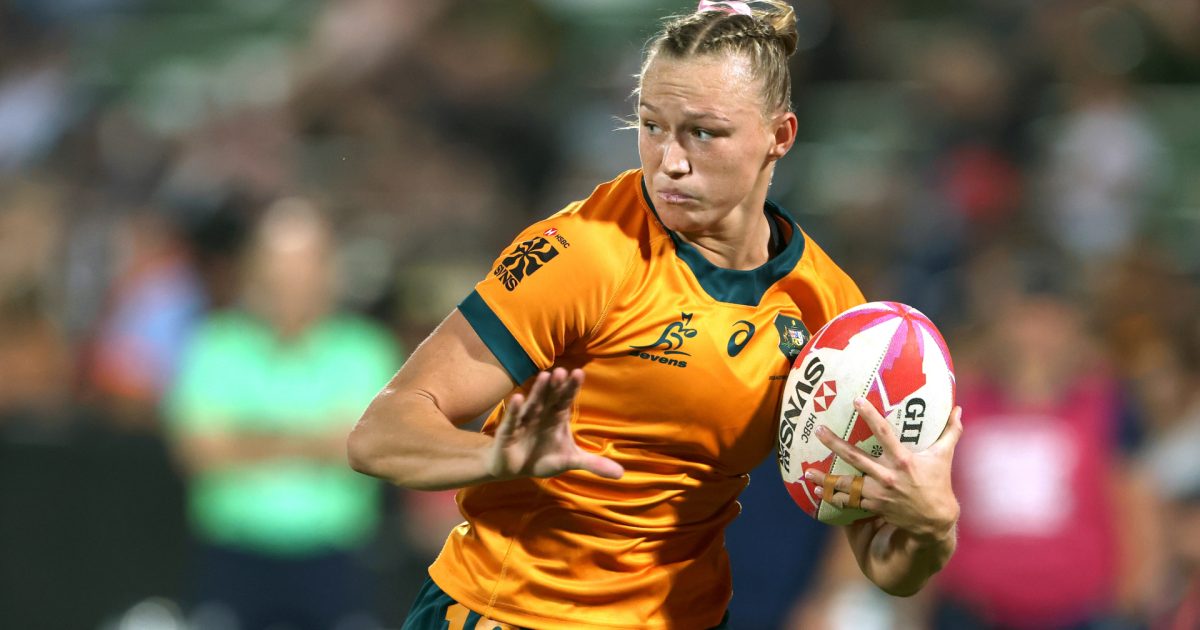Maddison Levi stars as Australia claim Olympic payback with dominant win

Defending HSBC SVNS Series champions Australia have claimed some payback for one of their heartbreaking defeats at the Paris Olympic Games. In the Dubai Sevens quarter-finals, the Aussie women showcased their flair and class during a clinical 39-nil win over Canada.
In one of the more surprising upsets at this year’s Olympic Games, Canada knocked the Aussies out of gold medal contention with a 21-12 triumph in the semi-finals. The Canadians eliminated sevens heavyweights France in the quarters and pushed New Zealand in the battle for gold.
Australia’s Faith Nathan recently told RugbyPass at the Rugby Australia Awards that Canada was “probably the strongest team” in women’s sevens going into the 2025 season. It was a bold claim but also one with plenty of merit following the silver medallists’ run in Paris.
But with coach Jocelyn Barrieau only selecting four Olympic silver medallists in the squad for the season-opener in Dubai, there was a bit of a new-look feel about that roster. Piper Logan, Carissa Norsten, Asia Hogan-Rochester and Shalaya Valenzuela were those Olympians picked.
Canada opened their tournament in Dubai with a shockingly emphatic 40-5 loss to Japan, who went on to make the Cup quarter-finals. The women in red bounced back with a big win over Brazil before falling to New Zealand 38-5 in a rematch of the Paris Olympics gold medal game.
With Canada finishing third in Pool C and only qualifying for the Cup knockouts on points difference ahead of Pool A’s China, Barrieau’s team still had a chance to push for Cup final glory. But waiting for them in the quarters was an in-form Australian outfit out for revenge.
The Aussies had flown through pool play with three wins from as many matches, which saw them finish on top in Pool A with a points difference of +106. It wasn’t a surprise to then see them carry that form into the knockout stage with a dominant display in the UAE.
It started the way most people would expect. Maddison Levi scored her 10th try at the Dubai Sevens – an incredible feat just one minute into Australia’s fourth match at the tournament – and Tia Hinds converted the effort to give them an early seven-nil lead.
Levi sliced through a couple of tackle attempts to add another five points to Australia’s lead as they began to take control of the contest. Younger sister Teagan Levi linked up with Faith Nathan with time up on the clock to give the Aussies a dominant 19-nil half-time lead.
There was a sense of déjà vu early in the second term with Levi completing a scintillating hat-trick about 30 seconds after the break. Captain Isabella Nasser, Demi Hayes and Nathan all scored a try each as Australia recorded an incredible win under the Dubai sun.
That was Australia’s first win over Canada on the SVNS Series since a 31-14 win in Perth earlier this year. Canada got the job done in their most recent meeting outside of the Olympics, which was a tense 19-14 triumph in the 2024 SVNS Vancouver third-place playoff.
Australia will take on Great Britain in the semi-finals as they look to keep their trophy-winning run in Dubai alive. GB got the better of Japan 26-nil earlier on day two, which saw the Japanese women fall short of what would’ve been their first-ever semi-final appearance.
On the other side of the draw, New Zealand were the first side to book their spot in the final four. The Black Ferns Sevens registered a comprehensive 33-12 win over Ireland, which saw four different try scorers contribute, as well as the accurate goal-kicking boot of Risi Pouri Lane.
Kelsey Teneti got the party started for the Olympic champions with a try in the first minute. Jorja Miller, who is wearing no. 2 this season, scored a couple of minutes later and an effort from Mahina Paul just before the break saw the Kiwis take a dominant 21-7 lead into the half-time huddle.
Miller completed a double just after the interval, and Katelyn Vahaakolo also added a five-pointer in the 11th minute. Experienced campaigners Amee Leigh Murphy Crowe and Eve Higgins were the two try scorers for Ireland during this one-sided loss.
France will take on New Zealand for a spot in the women’s Cup Final after beating the USA 38-12. Anne-Cecile Ciofani set the tone with a first-half double, and teenager Perrine Fagnen showed individual brilliance by outpacing the covering sweeper to score her first try on the Series.
Ian Jason crossed for a decisive try about one minute into the second term which gave the French the largest lead of that quarter-final showdown. Fagnen completed a double soon after during the clinical triumph in the Dubai Sevens eliminator.























































































